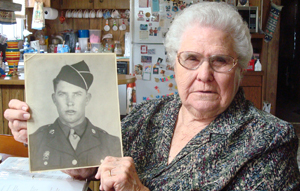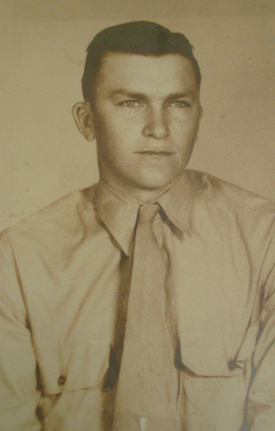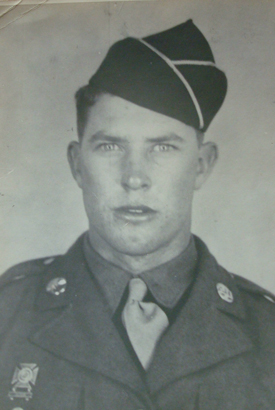Part I: “The Cough Drop Twins”–Two young men from Mississippi join the Army
"The Cough Drop Twins", Julian R. Smith (top) and Oscar A. Smith (bottom) in their army uniforms.
By Elva Jo Crawford
Julian R. Smith and Oscar A. Smith were not twins, nor brothers, nor related in any way for that matter. But when the two young men from the same part of southwestern Mississippi joined the Army Infantry to serve in World War II, the two quickly became good friends and kindred spirits. They were soon dubbed by their fellow soldiers as “The Cough Drop Twins" after the popular Smith Brothers brand of cough drops in the 1940s that had the inventor's sons' photos on the front of the package. Julian and Oscar had attended different high schools, but the schools were in close enough proximity to each other in the Bogue Chitto area that the two young men had actually played in high school basketball games against each other. They both signed into the army and had their Basic Training at Camp Shelby, Mississippi, and they both trained to be in communications in the infantry – radio linemen.
Certainly, when they stepped into Camp Shelby in the late fall of 1943, still both teenagers, they could have had no idea of the severity of the hardships that awaited them. Less than one year later, they would find themselves on the front lines of one of the bloodiest campaigns of the war in Europe in the Lorraine Province area of France on the German border.
Julian and Oscar were part of the 328th Regiment of the 26th Infantry Division – the "Yankee Division" of the United States Army. Once in France, these units would become part of Patton's 3rd Army. General George S. Patton had been purposely kept distant from the D-Day Invasion of Normandy. He was made into sort of a decoy in an area much further north of the invasion site since the Nazis were carefully watching him and expecting that he would be the one to lead the invasion that they knew was coming.
After D-Day, General Patton was fully back in the fray, assigned as head of the 3rd Army. Julian says he never saw General Patton, but there was always a multitude of stories going around the troops about him. One of Patton's slogans he says he remembers best is that the army was going in only ONE direction… and that was "Forward." There would be NO going backward. General Patton had been rapidly moving across France after the D-Day invasion and fully intended to move into Germany and end the war before Christmas. The 328th Regiment would be fresh reinforcements to continue to move this plan forward.
On August 26, 1944, these reinforcements from the 328th Regiment boarded the ship The Santa Rosa in the United States and headed across the Atlantic Ocean for France. On September 7, 1944, they climbed over the side of the ship into the waters off Utah Beach, Normandy, and waded to shore carrying all their gear. Initially, he says, there was no sign of resistance or gunfire, but about 300 yards onto the beach, the sniper fire started. The Nazis had been taught to fight fanatically to the finish, even if there was only one or two of them remaining. Small pockets of Nazi resistance were still abounding in France, and Julian says that from beginning to end there was never a time you could let your guard down. This was just the beginning of his war experience.
Due to a multitude of logistical problems, General Patton had not been able to continue his lightning-fast move across France into Germany to end the war before Christmas as he had wanted. He had had to stop, regroup, and wait on gasoline and other necessary supplies, all this despite heroic efforts by truck drivers who were risking their lives delivering hundreds of thousands of gallons of gasoline and other supplies every day to the front lines. It had become impossible to keep up, so the Allied move came to a halt. Americans back in the States during this time were having things like tires and gasoline very strictly rationed to give first priority to the needs overseas.
Hitler used this lull in the Allied pursuit to have the German army vigorously dig in as a last-ditch effort to save Germany from being invaded. Even though everyone knew this was futile, Hitler foolishly persuaded his camp that the war could still be won by Germany. This only served to miserably prolong the war and suffering, and to increase the casualty count for another 6 months.
Arriving in the Lorraine area in the fall Julian and Oscar fulfilled their duties as Infantrymen to the fullest, taking responsibility for keeping radio communications open as well as laying telephone lines. Besides protecting their lives from the Germans, these soldiers would also have to battle torrential rains, flooding, and severely cold weather, which was causing as much injury to Allied troops as gunfire and the Nazi war machine. In addition, the enemy was constantly cutting their phone lines, breaking down vital lines of communication. Often the cutting of phone lines by the enemy served as an ambush technique to attack the infantrymen who were trying to locate the break in the line to repair it. Most often problem phone lines simply had to be replaced with new lines rather than risk soldiers being killed looking for problems along the old lines. Laying of the phone lines was usually done at night.
Julian and Oscar were also responsible for carrying on their shoulders the large radio communications boxes. Julian recalls many times the enemy would break into Allied radio communication, disguising their voices to get information about the Americans' locations, status, etc. Once, he says, an officer was tricked into giving out their location over radio, believing the person on the radio was friend and not foe. The regiment immediately paid for that mistake, receiving a bombardment by the Nazis.
In his last battle series in France, after 45 days wearing the same soaking wet wool uniform in the freezing rain, sleet and snow, Julian woke up on the 46th day unable to move. He had curled up into a fetal position the night before to get enough warmth to be able to fall asleep. When he finally did wake up the next morning his uniform was a solid block of ice. He called to some of his fellow soldiers to help him break free of the ice. They broke the ice loose, but Julian could not stand up. Oscar's uniform was also frozen solid. Both of them were taken to Medical for evaluation. When the medic took off Julian's shoes, his feet swelled horribly and he was unable to stand. He was sent to a field convalescent hospital and then to London to receive care for frostbite. Julian says that when he left the 328th Regiment to go to Medical, 80 of the men he was serving with at that time were replacement troops for the original group he had started with. Injuries or death had taken 80 of his original infantry group off the field of battle!
In the hospital in London, Julian was put in a ward for treating men with frostbite, where every four hours each of the men was given a shot of whiskey by the nurses. He says he is not sure if the whiskey was for circulation, pain, or something else. In addition to that, the men received injections in their feet each morning by the physicians when they made rounds. He says he is not sure what medication was in those injections.
Eventually, he was taken back to the United States by ship to continue medical care. It would be six months before he could walk. Even though he did not lose any fingers or toes, he would have permanent, life-long numbness in his hands and feet from the nerve damage.
October 17, 1945, Julian was discharged from the U.S. Army. He received two Bronze Stars, the Combat Infantry Badge, the Good Conduct medal, and the European-African-Middle Eastern service ribbon. The war in Europe had been over since May and the war with Japan had ended a few weeks earlier in September of 1945.
Julian's dear Army friend Oscar Smith did not survive the war. The day he went to Medical with Julian to be evaluated for frost bite, Oscar's feet did not have the severe swelling reaction that the medics were looking for. He was deemed fit for battle and sent back to the front lines, where two days later the foxhole he was in was hit by SS artillery and he was killed. Oscar Smith received the Army's Silver Star.
Julian says he still does not know why God kept him alive, but he's sure He had His reasons. There were times on the battlefield that conditions were so bitter that Julian did not care if he lived or died. He believes that God has removed the worst of the war memories from his mind. Otherwise, he says, he does not believe he could have gone on with his life. After being discharged from the Army, however, Julian did go on with his life. See part II of his story, "Julian and Velva".

Now 89 years old, Mrs. Mildred Smith Brown still recalls like it was yesterday getting the news that her youngest brother, Oscar A. Smith, had been killed in France. It was 67 years ago this month. In the photo above, she is holding Oscar's Army photo. Mildred's husband and all four of her brothers served in the military during WWII. The day she received the telegram notifying the family of her youngest brother's death in battle, she was at her mother's home in Mississippi. Mr. Charles Posey was a taxi cab driver in Lincoln County and back then delivered all the military telegrams for that area. He had already been by not long prior to this with a telegram regarding her oldest brother, Bracie, who had been injured in Europe but was expected to recover. So, when Mr. Posey drove up to the house for a second time, Mildred was sure it was just an update on Bracie' s condition. Even when Mr. Posey asked her if she had other family with her that day, she did not expect bad news. The contents of this telegram, however, were a complete shock – her youngest brother, Oscar, had been killed. She took the telegram and walked, still in shock, to another home nearby where most of the family was visiting with her third brother who was home on leave from Pearl Harbor, Hawaii. Never in a million years was anyone expecting this news. Oscar was nineteen and-a-half years old.
It would be 10 more months before Oscar’s body made it back to McCall Creek, Mississippi, for a military burial at the Ramah Baptist Church Cemetery. The war in Europe was over by that time.
Approximately 405,000 American lives were lost in World War II. 489 of those lives lost were from the 328th Regiment of the 26th Infantry Division, the Yankee Division.
 Now 89 years old, Mrs. Mildred Smith Brown still recalls like it was yesterday getting the news that her youngest brother, Oscar A. Smith, had been killed in France. It was 67 years ago this month. In the photo above, she is holding Oscar's Army photo. Mildred's husband and all four of her brothers served in the military during WWII. The day she received the telegram notifying the family of her youngest brother's death in battle, she was at her mother's home in Mississippi. Mr. Charles Posey was a taxi cab driver in Lincoln County and back then delivered all the military telegrams for that area. He had already been by not long prior to this with a telegram regarding her oldest brother, Bracie, who had been injured in Europe but was expected to recover. So, when Mr. Posey drove up to the house for a second time, Mildred was sure it was just an update on Bracie' s condition. Even when Mr. Posey asked her if she had other family with her that day, she did not expect bad news. The contents of this telegram, however, were a complete shock – her youngest brother, Oscar, had been killed. She took the telegram and walked, still in shock, to another home nearby where most of the family was visiting with her third brother who was home on leave from Pearl Harbor, Hawaii. Never in a million years was anyone expecting this news. Oscar was nineteen and-a-half years old.
Now 89 years old, Mrs. Mildred Smith Brown still recalls like it was yesterday getting the news that her youngest brother, Oscar A. Smith, had been killed in France. It was 67 years ago this month. In the photo above, she is holding Oscar's Army photo. Mildred's husband and all four of her brothers served in the military during WWII. The day she received the telegram notifying the family of her youngest brother's death in battle, she was at her mother's home in Mississippi. Mr. Charles Posey was a taxi cab driver in Lincoln County and back then delivered all the military telegrams for that area. He had already been by not long prior to this with a telegram regarding her oldest brother, Bracie, who had been injured in Europe but was expected to recover. So, when Mr. Posey drove up to the house for a second time, Mildred was sure it was just an update on Bracie' s condition. Even when Mr. Posey asked her if she had other family with her that day, she did not expect bad news. The contents of this telegram, however, were a complete shock – her youngest brother, Oscar, had been killed. She took the telegram and walked, still in shock, to another home nearby where most of the family was visiting with her third brother who was home on leave from Pearl Harbor, Hawaii. Never in a million years was anyone expecting this news. Oscar was nineteen and-a-half years old.



0 comments